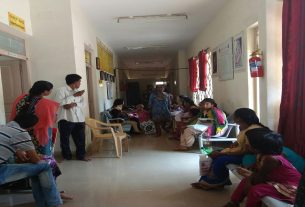Reduction in the rate of screening tests could lead to lack of early detection which doctors say is life-threatening.
Karnataka has seen a sharp fall in the number of screening tests for the detection of cervix cancer. Experts said lack of awareness is the key cause.
The National Family Health Survey (NFHS) published by the Ministry of Health and Family Welfare (MOHFW) states that there has been a 15 per cent reduction in screening tests for cervix cancer among women in Karnataka. The rate has come down from 16 percent to one percent.
Experts say that the reason for decrease in screen percent is due to lack of awareness among women. Dr. Renuka, a gynecologist agrees, she said, “Many women in the city are aware of this cancer but not many are aware of its check-up.” She said that it’s only when they go in for other reasons to a doctor that they get the test done on the advice of the clinician.
Aruna Tamang, a homemaker said, “I never got a test for cervix cancer done. The complete body check-up doesn’t include it so I never knew about it.”
Atashi Sharma, a school teacher said, “I have done a pap smear test just one time when fibroids were detected in my uterus.”
Dr. Renuka explained that cervix cancer is caused due to Human Papillomavirus (HPV) infection. The recurrent infections lead cervix cells to undergo malignant changes and cause cervix cancer. Iits symptoms include excessive white discharge, pelvic pain and bleeding after sexual intercourse.
She said that the cancer is caused at a young age. “It is common in young women and is also called young age cancer. It is common in women at childbearing age, it may be diagnosed later but it is caused at a young age,” she added. She also said that It is the fourth most common cancer among women worldwide and second most common among women in India after breast cancer.
The Clinicopathological Profile of Cancers in India: A Report of Hospital-Based Cancer Registries 2021 published by the Indian Council of Medical Research (ICMR) and National Centre for Disease Information and Research (NCDIR), Bengaluru states 12 percent of total cases in females are of cervix cancer in Karnataka.
Regarding prevention of the disease Dr Renuka said, “It is a sexually transmitted disease so using barrier contraceptives reduces risk. Regular checkups also reduce the risk and early detection can help in saving the life of the woman.”
She further explained that there are vaccines available for its prevention. They are administered by paediatricians to girls between the ages of 10-12 years. With its three-dose course and one-time vaccine, these vaccinations are given to girls before they are sexually active. The two HPV vaccines are bivalent and quadrivalent. On its efficacy she said, “The quadrivalent vaccine gives 100% protection against infection.”
The screening test is called the Pap smear test in which cells in the cervix area are collected by a spatula. The test is easy to perform and can be done easily in rural areas also. This test has to be done by a gynaecologist. It is advised for women after 30 to get the test done once in two years.
The Karnataka government has various schemes for financial help to cancer patients like Jyothi Sanjeevini Scheme, Ayushman Bharat Scheme, Arogya Karnataka Scheme etc. Still the fall in the number of screening tests shows that other interventions are needed.




